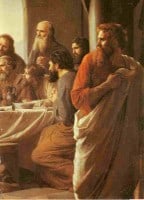Podcast: Play in new window | Download
Subscribe: RSS

No matter how you cut it, this man was an enigma.
As you will hear in this PODCAST, this man — handpicked by Jesus and elevated to the rarified air of the apostles — repaid Jesus’ generosity by betraying Him to His executioners.
Is there any human emotion more painful than that of betrayal?
Ever felt it? Betrayal?
That midnight darkness of the soul that enshrouds us like an impenetrable fog when we have dared to trust someone — with our deepest feelings, our most hidden secrets, as if we have just entrusted to the person our very hearts, perhaps our very lives — only to have him or her shatter our hearts and break our trust by their soul-crushing betrayal.
Jesus sure felt it. The pangs of betrayal. Boy, did He ever!
That moment frozen in time when for the first time you see with crystal-clarity that you have been played.
Well, for 3½ years Jesus had been played. 
Where did this man — Judas Iscariot — come from? What causes a man to make the fateful plunge from believer to betrayer? What do we really know about him?
You are about to find out.
But even more importantly, you are about to see the heart of Jesus in action as He responds in real time to this real threat posed by this very real con man, the Apostle Judas Iscariot.
Let’s begin by reading John 6:70-71
70 Jesus told his disciples, “I chose all twelve of you, but one of you is a demon!” 71 Jesus was talking about Judas, the son of Simon Iscariot. He would later betray Jesus, even though he was one of the twelve disciples.
I would have loved to have a hidden camera focused on Judas’ face at that moment to see if and how he reacted at these words!
Welcome to the first day of the last year of Jesus’ ministry!
Now, John wrote these words some 60 years after Jesus’ betrayal, and you can tell by his tone that he was still in utter disbelief that one of Jesus’ own disciples could betray Him!
So, who was this man who now personifies betrayal, even to people without any Christian heritage whatsoever?
First off, the name “Judas” was quite common and unremarkable. Jesus, Himself even had a brother named Judas, as we see in Matthew 13:55 –
“Isn’t this the carpenter’s son? Isn’t his mother’s name Mary, and aren’t his brothers James, Joseph, Simon and Judas?”
Additionally, there were even two men named Judas among the twelve chosen disciples of Jesus. Luke 6 refers to him as “Judas, the son of James”; while John 14 identifies him as “Judas, not Iscariot”.
There’s even an additional Judas mentioned in Acts 5 – one of the many false messiahs that were sprouting up around Jerusalem at the time.
Then in Acts 9, after Paul encounters Jesus, on the road to Damascus, he sought shelter on Straight Street, at the home of a man named Judas.
Later on in Acts 15, we are introduced to a close colleague of Paul named Judas who traveled along with Paul on one of his missionary journeys.
All this to simply say that Judas was a very common name at the time. It’s actually the Greek form of the name. The Hebrew version is Judah, which means “praise”, so no doubt, even Judas Iscariot’s parents named him with the hopes that he would grow to praise God and be a source of praise to Him. But, as it turned out, this Judas would go “0-for-2”.
Judas’ “last name”, Iscariot, actually isn’t a last name, but a geographical designation (on a side note, as was “Magdalene” for Mary). It’s actually a compound word: Is means “man” and Carioth is a town in Southern Judah. So, when we read “Judas Iscariot”, what we are really reading is “Judas, the man from the village of Carioth, Judah”. This is interesting because of all twelve of the chosen disciples, Judas was the only one who came from the south. All the other eleven came from the north. This was incredibly significant, as the north and south of Israel behaved as though they were practically two different countries. Galileans (northerners) were largely farmers with ample crops each year since much of the land was below sea level. In Jerusalem (south), 3,000 miles above sea level, farming was nowhere near as abundant. Most southern Jews were herders who lived in the desert.
The two were totally different cultures.
They even spoke differently, as we see in Matthew 26:73
73 A little later some of the other bystanders came over to Peter and said, “You must be one of them; we can tell by your Galilean accent.”
Another interesting aspect of Judas is that we know very little about his life before meeting Jesus, especially compared to several other disciples. Of the other eleven, we know that one was a tax collector, that a few were fishermen, that one was a zealot… but we have no record of what Judas did before he met Jesus. We don’t even have a record of how, when or why he crossed paths with Jesus to begin with. He appears out of nowhere:
2 Now the names of the twelve apostles are these: first, Simon, who is called Peter, and Andrew his brother; James the son of Zebedee, and John his brother; 3 Philip and Bartholomew; Thomas and Matthew the tax collector; James the son of Alphaeus, and Lebbaeus, whose surname was Thaddaeus; 4 Simon the Cananite, and Judas Iscariot, who also betrayed Him. (Matthew 10:2-4)
That’s the first time Judas is mentioned in Matthew’s Gospel. Mark’s Gospel is similar:
14 Then He appointed twelve, that they might be with Him and that He might send them out to preach, 15 and to have power to heal sicknesses and to cast out demons: 16 Simon, to whom He gave the name Peter; 17 James the son of Zebedee and John the brother of James, to whom He gave the name Boanerges, that is, “Sons of Thunder”; 18 Andrew, Philip, Bartholomew, Matthew, Thomas, James the son of Alphaeus, Thaddaeus, Simon the Cananite; 19 and Judas Iscariot, who also betrayed Him. (Mark 3:14-19)
Another commonality between all four Gospels in regards to their introduction of the disciples is that Judas is always listed last. The first time Luke mentions Judas is no different:
He called His disciples to Himself; and from them He chose twelve whom He also named apostles: 14 Simon, whom He also named Peter, and Andrew his brother; James and John; Philip and Bartholomew;15 Matthew and Thomas; James the son of Alphaeus, and Simon called the Zealot;16 Judas the son of James, and Judas Iscariot who also became a traitor. (Luke 6:13-16)
And, while John may not have done the typical roll call with the names of each of the disciples, his introduction of Judas follows suit with the other three:
70 Jesus answered them, “Did I not choose you, the twelve, and one of you is a devil?”71 He spoke of Judas Iscariot, the son of Simon, for it was he who would betray Him, being one of the twelve. (John 6:70-71)
Now, think of this: Jesus, knowing that Judas would betray Him, picked him anyway. That is amazing to me. Not only that, but He chose him after spending an entire evening praying to God about who He should choose.
12 Now it came to pass in those days that He went out to the mountain to pray, and continued all night in prayer to God. 13 And when it was day, He called His disciples to Himself; and from them He chose twelve whom He also named apostles (Luke 6:12-13)
This wasn’t a willy-nilly draft / random pick of guys who happened to be around Him. The Almighty God was involved in the selection process! And still, Judas returned that favor with betrayal.
One final tidbit about Judas is one that may reveal, in hindsight, a hint leading toward why he would have done something like betray the Messiah. Throughout his tenure as an Apostle, Judas had a treacherous heart. What is amazing is that nobody picked up on it, as intimate as these twelve guys (thirteen, including Jesus) were, nobody had any idea, even in the upper room on the night that Judas would betray Him! They had no idea!
This is a con man beyond all con men!
The fact is, even from the beginning of his joining Jesus in His ministry, Judas lived a double life. He was an absolute phony – a full on hypocrite! Prior to his betrayal, Scripture details a series of several small compromises that Judas makes along the way. Infinitesimal compromises, almost always having to do with money. Which, in time, led to Judas doing the unthinkable for money. Realize that Judas did not sell Jesus over for 30 pieces of silver until after he had sold his own soul over and over again.
Six days before the Passover celebration began, Jesus arrived in Bethany, the home of Lazarus—the man he had raised from the dead. 2 A dinner was prepared in Jesus’ honor. Martha served, and Lazarus was among those who ate with him. 3 Then Mary took a twelve-ounce jar of expensive perfume made from essence of nard, and she anointed Jesus’ feet with it, wiping his feet with her hair. The house was filled with the fragrance.
4 But Judas Iscariot, the disciple who would soon betray him, said, 5 “That perfume was worth a year’s wages. It should have been sold and the money given to the poor.” 6 Not that he cared for the poor—he was a thief, and since he was in charge of the disciples’ money, he often stole some for himself. (John 12:1-6)
Judas regularly – habitually – stole from the ministry’s offering! The thing about repeated sins – repeated compromises – is that every time we commit one and get away with it, our heart grows a little colder, our spirit a little colder, until finally we pass the point of no return. Just like Judas did.
Nevertheless, Jesus loved Judas. He loved him until the very end. In the upper room, on the night that Judas would betray Him, with Judas still in the room and Jesus fully knowing what Judas was conspiring to do, Jesus loved him.
Before the Passover celebration, Jesus knew that his hour had come to leave this world and return to his Father. He had loved his disciples during his ministry on earth, and now he loved them to the very end. 2 It was time for supper, and the devil had already prompted Judas, son of Simon Iscariot, to betray Jesus. 3 Jesus knew that the Father had given him authority over everything and that he had come from God and would return to God. 4 So he got up from the table, took off his robe, wrapped a towel around his waist,5 and poured water into a basin. Then he began to wash the disciples’ feet, drying them with the towel he had around him. (John 13:1-5)
Notice that there is no exception clause here – nothing saying, “He loved all of them, with the exception of Judas.” And what was Judas thinking as Jesus was washing his feet?
And speaking of loving Judas until the very end, even at the very moment of his betrayal, in the Garden of Gethsemane, Judas led the troops into the garden and pointed Jesus out… with a kiss.
48 The traitor, Judas, had given them a prearranged signal: “You will know which one to arrest when I greet him with a kiss.” 49 So Judas came straight to Jesus. “Greetings, Rabbi!” he exclaimed and gave him the kiss.
50 Jesus said, “My friend, go ahead and do what you have come for.” (Matthew 26:48-50)
With several hundred troops rushing to arrest Him, Jesus acknowledges Judas with one of the most endearing greetings that any Jewish man can to another. Even today, when somebody greets you this way in the Middle East, it means that they regard you as someone bound to you in loyalty and love. “My friend” is not used lightly in the Middle East. It means that they trust their friend implicitly.
So, even as Judas betrayed Jesus, Jesus would never betray Judas.
And, if Jesus never turned His back on Judas, you can be sure that He will never turn His back on you!
Also, know this: throughout the three-and-a-half years that they were together, Jesus know the entire time about the treachery in Judas’ soul. If you think about it, Jesus did everything He could over that time to warn Judas to not make this fatal choice. How many parables did Jesus tell about the hardening of someone’s heart? How many warnings did Jesus give about the poisonings of pride? How many times did He plead that His followers would not become hateful or bitter?
Even as Jesus was washing their feet in the upper room, Jesus said to the twelve of His disciples:
“…And you are clean, but not every one of you.” 11 For He knew who was to betray him; that was why He said, “Not all of you are clean.” (John 13:10-11)
It’s as if Jesus was pleading with Judas, “You don’t have to do this! There are plenty of other people out there who want to kill me, I don’t need YOUR help to get to the cross!”
But, Jesus went on:
8 “I am not referring to all of you; I know those I have chosen. But this is to fulfill this passage of Scripture: ‘He who shared my bread has turned against me.’
19 “I am telling you now before it happens, so that when it does happen you will believe that I am who I am. 20 Very truly I tell you, whoever accepts anyone I send accepts me; and whoever accepts me accepts the one who sent me.”
21 After he had said this, Jesus was troubled in spirit and testified, “Very truly I tell you, one of you is going to betray me.”
22 His disciples stared at one another, at a loss to know which of them he meant. 23 One of them, the disciple whom Jesus loved, was reclining next to him. 24 Simon Peter motioned to this disciple and said, “Ask him which one he means.”
25 Leaning back against Jesus, he asked him, “Lord, who is it?”
26 Jesus answered, “It is the one to whom I will give this piece of bread when I have dipped it in the dish.” Then, dipping the piece of bread, he gave it to Judas, the son of Simon Iscariot. 27 As soon as Judas took the bread, Satan entered into him.
So Jesus told him, “What you are about to do, do quickly.” 28 But no one at the meal understood why Jesus said this to him. 29 Since Judas had charge of the money, some thought Jesus was telling him to buy what was needed for the festival, or to give something to the poor. 30 As soon as Judas had taken the bread, he went out. And it was night.
Here’s the kicker: When it comes to you and me, nobody will ever remember how our stories begin – just like Judas. But they will remember how you and I end our stories. Which is why we want to end well.